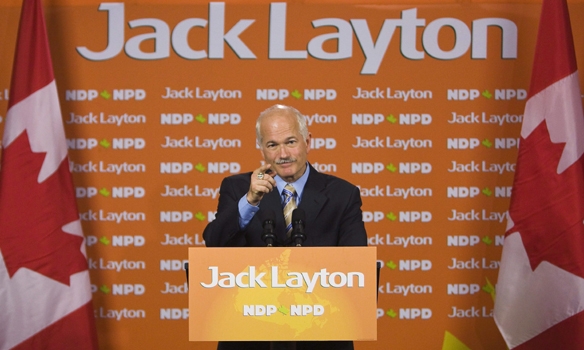
Remembering Jack Layton: 1950 – 2011
For many Canadians yesterday began as an ordinary day. The sun rose on a prematurely cool August morning. A new work week had begun. And then the news that Jack Layton passed away at approximately 4.45a.m. that morning at the age of 61 started to spread. In this era of instant communication and social media, on-line vigils sprung up like shoots of grass after a heavy rainfall. But many Canadians were not content to share their grief merely on facebook or twitter. Well into the evening last night Canadians across the country were holding vigils in public parks or on city streets. People wrote condolences on sidewalks or in any public space where people were gathering to mourn Jack’s passing. When asked about the man, many people who didn’t even know him could hardly contain their tears. Prime Minister Harper recalled conversations with Jack during which they talked about “jamming” together. That possibility is now lost and the prime minister seems genuinely sorry for it. The spontaneous and shared outpouring of grief speaks to the power of Jack Layton’s convictions. As he eloquently conveyed in his last letter to all Canadians, he believed in our ability to shape our world for the better. Love was better than anger, he reminded everyone; hope better than fear and optimism better than despair. In a world in which many feel both hopeless and powerless, this sort of message resonated. That he conveyed it knowing that he was about to succumb to the cancer that had so aggressively ravaged his body made it all the more poignant. How could people not be moved by his courage and grace in the face of his imminent death? In the last year of his life, Jack secured his place in our hearts.

It was not, of course, always this way. Jack has been in politics for years, most of it spent as a Toronto city counselor. There he learned politics was less about securing sweeping victories and more about mastering the art of compromise. Progress could be painstakingly slow and there would be many setbacks. He ran for mayor of Toronto in 1991 but lost to June Rowlands. On this and many other occasions, his political obituary was prematurely written. If he wasn’t being written off, he was often spoken of derisively. He was called a “career politician” who was no more trustworthy than a used car salesman. He would never be trusted to hold the reins of power at any level of government. This perception hardly changed when he was elected leader of the federal NDP in 2003. Some commentators believed that his leadership would merely accelerate the party’s descent into obscurity. It wasn’t that long ago that he was contemptuously referred to as “Taliban Jack,” for his suggestion that ending the conflict in Afghanistan may require negotiating with the Taliban. I always thought the dismissive reaction to this suggestion wasn’t so much because politicians and media analysts found the notion too odious to consider. Any thoughtful observer realized that the Taliban, for all of their medieval ways, are strategically capable of prolonging the Afghan conflict indefinitely and therefore at enormous human cost. It was more a reflexive response, intended to immediately marginalize Jack from a critical debate. For too long, it seems to me, Jack Layton didn’t get the respect he deserved.
Somewhere along the way this all changed. Family members and those who worked closely with him must have realized long before ordinary Canadians that Jack possessed an increasingly rare combination of skills and gifts. As he got older and became more comfortable as a federal leader, those skills and gifts were refined. He was, by all accounts, a charming man with a smile that could immediately win over a room. Jack really would want to have a beer with you. But charm cannot, in the end, take you a long way in politics. He was also thoughtful and intelligent. And he firmly believed that whatever intelligence he possessed should be used to help the socially disadvantaged and politically excluded. If this strikes the reader as hyperbole, it is worth remembering that Jack wrote a book on homelessness. Such an endeavor neither was a sure fire way to get elected or to make a lot of money. On the contrary, writing a book on any subject requires sustained commitment over a prolonged period of time. There must have been bouts of frustration, perhaps even a sense of pointlessness. Yet he finished it. That he chose to write on the socially disadvantaged and excluded was a testamentto his commitment to a better type of politics. It was also in keeping with his work for those suffering from HIV/AIDS at a time when the disease was still poorly understood. In the wake of the Montreal massacre, he co-founded a campaign to counter male violence towards women. Politics, he believed, had to address some of society’s most troublesome inequities.

But charm and intelligence alone do not account for Jack Layton’s extraordinary rise. There was also the man’s equally extraordinary determination. Among the most memorable images from the last federal election are of Jack walking everywhere with a cane. At the start of the campaign, he had only just finished treatment for his prostate cancer. But there was to be little reprieve: after the cancer he had to have hip surgery. The walking aid was necessary but it did nothing to diminish the perception that Jack was exceptionally energized. After the votes were counted on election night and he had secured his greatest political achievement, he still managed, with cane in hand, to gallop up the stairs to give the party their own victory speech. The NDP had not, of course, won the election but they had increased their seat count from 37 to 103. They had won over Quebec and were now the Official Opposition. Party members were rightfully proud. So too were most Canadians. His fight with cancer, his seemingly inexhaustible energy, the grace with which he conducted himself and his belief in the power of people to still shape our world had finally resonated with Canadians on the sort of scale he must have hoped for when he entered politics so many years ago. It was no longer possible to dismiss him. The respect – nay the love – people had for him ran too deep.
Life’s ironies can sometimes be cruel. As he stood on the stage on May 2nd with his wife Olivia Chow, energized by the party’s achievements, the cancer that he thought he had beaten was about renew its presence. With a vengeance. We would see him in subsequent days, still vigorous and seemingly healthy. But before long the public appearances grew fewer. When he gave his extraordinary press conference on July 25th it was startling to see how aggressively this new cancer had advanced. He was gaunt and frail, his voice prematurely aged. Cancer had clearly taken its grim toll. Yet he still spoke with optimism about the prospect of making a full recovery and being back in the House of Commons come September. It was not to be.

Jack’s death comes a pivotal moment in the life of the NDP. Various factors help explain the party’s sudden rise and electoral success. But none was more important than Jack Layton himself. Their continued success can hardly be taken for granted. How will the party respond to the challenge of moving forward without their beloved leader? How will Canadians respond now that the face of the party so many have recently embraced is suddenly gone? It’s hard to know. What is certain is that Jack reminded us that hope and human decency still matter in Canadian politics. He will be sorely missed.













